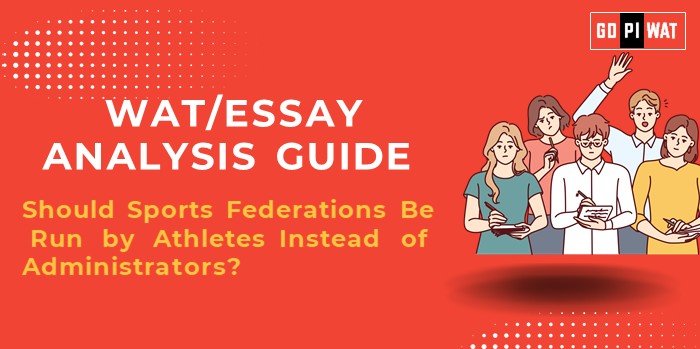📋 Written Ability Test/Essay Analysis Guide
🏅 Should Sports Federations Be Run by Athletes Instead of Administrators?
🌟 Understanding the Topic’s Importance
📚 Relevance for B-Schools: The topic explores leadership, ethical governance, and stakeholder management—skills integral to B-school pedagogy.
📝 Effective Planning and Writing
- ⏳ Time Allocation:
- Planning: 5 minutes
- Writing: 20 minutes
- Reviewing: 5 minutes
📖 Essay Structure
🔑 Introduction Techniques
- 📊 Contrast: “While athlete-led governance prioritizes welfare, operational expertise remains a challenge in such systems.”
- 💡 Solution-Based: “The debate over governance models in sports federations calls for solutions blending athlete-centric approaches with administrative rigor.”
📖 Body Paragraphs
- 🏆 Achievements:
- Use global and regional examples like New Zealand or IOC reforms.
- ⚠️ Challenges:
- Highlight risks like lack of financial acumen or operational conflicts.
- 🔮 Future Outlook:
- Suggest hybrid governance as a sustainable model, citing case studies.
📄 Conclusion Templates
- ⚖️ Balanced: “While athlete-led federations offer empathy and insight, a collaborative governance model ensures operational efficiency.”
- 🌍 Global Comparison: “Drawing lessons from global examples, the future lies in combining athlete advocacy with seasoned administration.”
✨ Recommendations
- 🎓 Promote leadership training for athletes aspiring to governance roles.
- ⚙️ Introduce hybrid governance structures in federations globally.
✍️ Sample Short Essays
- ⚖️ Balanced Perspective:
“Athletes possess unique insights, but governance demands administrative acumen. A collaborative model is ideal.”
- 💡 Solution-Oriented:
“Hybrid governance merges the best of both worlds, ensuring efficient operations and athlete welfare.”
- 🌍 Global Comparison:
“Governance in sports federations must emulate global successes like Norway’s athlete-centric policies while avoiding pitfalls of administrative dominance.”


